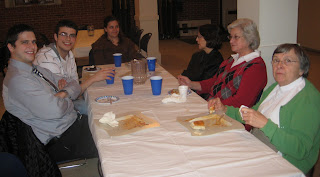After people ask about my upcoming trip to Africa, they usually follow up by asking, "but why out of all the places in the world, was Liberia chosen?" The answer is not a simple one.
In a future blog posting I can provide background on the history of Liberia and how it is intertwined with the US. I can focus on specific Millennium Development Goals (
MDGs). I can also link to documents on the
Companion Relationship Discernment Process. However, I think the starting place is not so anonymous or bureaucratic. It is deeply personal. Amazing Liberians, living in the Diocese of Southern Ohio, started teaching me about their country, their food, their music, their arts, their clothing, their history and about their civil war.
Then—I saw a movie. The documentary "
Pray the Devil Back to Hell" does an outstanding job of portraying both the war and the peace process. Peace was achieved through cooperation of women, both Christian and Muslim, as they took a Ghandi-like approach to overcoming destruction. In my previous blog, at the bottom, is a picture of a street in Liberia where so many empty shell casings litter the ground that a person can't walk without slipping on them. I refrained from linking to more gory pictures showing children's shoes in pools of blood. Even my active imagination can't conjure up the sounds and sights of what it must have been like to be anyplace close to the gunfights that resulted in the images portrayed by these pictures. So, Liberia has become visibly personal.
My mind goes to what I can do, as well as what we as a Christian community can do. In the Great Litany we pray to "beat down Satan under our feet." Now is the time for me to act on those words. This delegation is going to Liberia to explore the possibilities for a companion relationship. Companions walk side by side. One is not ahead or behind. They support each other, using God-given gifts. To be part of a process that overcomes the work of evil dictators, geography and other barriers is taking a big risk. It is an act of faith. That is holy and personal, even as it is connected to a church organizational structure.
For those who want quantifiable reasons for selecting Liberia, just go to the United Nations Web site and download the documents evaluating Liberia on a global scale. According to the UN, "Years of conflict and mismanagement have left Liberia one of the poorest countries in the world..." Think Central and South America, Africa, the Pacific Rim and then think about the poorest countries in those areas. That is extreme. That is Liberia.
I can list data—extreme poverty is living on less than $1.25 US per day. 1.7 million Liberians are living in poverty. Of these, about 1.3 million people are living in extreme poverty, equivalent to 48 percent of the country's population. If you like statistics, there is a 190 page report on poverty in Liberia that will paint a much more granular, detailed picture.
Malnutrition, inaccessible primary school education, malaria, unsafe water, as well as destruction of infrastructure like roads and sources for electricity are some of the statistics that lead me to answer that whatever I can do, whatever we can do to assist them in their rebuilding, is going to make an enormous difference in the lives of Liberians. An elementary teacher makes about $75 US per month—not a living wage if that teacher has a family. A sponsor can increase the wages of that teacher by 33.3% by raising $25 per month. As one National and World Mission Commission member said, that is something he could manage. I think that is something many of us could manage.
There is hope—A sound government, new entrepreneurial businesses, higher education, and the Episcopal Church of Liberia (ECL) are just some of the ways Liberians are working together to manage their own future. The ECL does not have a long list of partnering diocese. As far as I know, they don't have any current active partners. Their parishes include adventurous, faithful individuals who came to the US last fall to talk about their vision, and to find out what they can do for us. I learned a great deal from those delegates and am excited to go and return the favor. I thank my family, and the parishes doing fund-raising, that are helping make the work of our delegation possible. The Liberians provided suggestions on things we can bring that would fill an immediate need (like stethoscopes). In return they expect the relationship to be a two-way street. Part of the explorations will be receiving the God-given gifts they bring to us. Gifts that I can share with each reader of this blog or viewer of YouTube videos I upload so the relationship is a community experience.
The only photo I have that seems to fit this posting is the Liberian cross made from a spent shell casing. It is a symbol of the hope and the faith that I now associate with our Liberian brothers and sisters. I believe that Liberia is the best, first place to nurture a new companion relationship. It may not be the only place. Bishop Breidenthal wrote and told me,
"Christ, “who came to preach peace to those who are far off and those who are near,” demands that we address both immediate and distant needs. Otherwise, how can we be part of a Body that knows no bounds?" I am taking his words personally and right now they lead me toward Liberia.




















